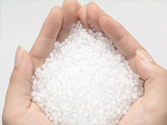China plastics co - degradation experts: what is the significance of developing bio-based plastics?
Bioplastics refers to polymers and their products which are processed and produced by renewable biomass resources, including bio-based synthetic materials and bio-based regenerated fibers.
At present, the development of bio-based plastics is of great significance. First, solve the environmental problems caused by the improper use of traditional petrochemical materials. To solve the white pollution caused by waste plastic through the application demonstration of agricultural film and packaging daily materials. Second, reduce the excessive dependence of Chinese industry on petroleum resources, save energy and reduce emissions, promote the structural adjustment of petrochemical materials industry, form new green economic growth points and promote economic development.
At present, China's recycled fiber; Organic acids, chemical alcohols, amino acids, etc. Starch based thermoplastic; Polybutanediol succinate (PBS); The total production of polylactic acid (PLA), polyhydroxy fatty acid ester (pha) and other biomaterials is about 5.5 million tons. The bioplastics industry has also gradually moved from the pilot stage to the industrial scale, and the industry has begun to take shape.
From 2013 to 2014, the compound growth rate of biopet was 26.7%, among which, the comprehensive production capacity of biopet was 800,000 tons/year. Pla200,000 tons/year; PBS, modified aromatic polyester (pbat) 200,000 tons/year; Biological basis 1, 3-propanediol (pdo), phthalic acid 1, 3-propanediol (PTT) 75,000 tons/year; Pha30,000 tons/year; Biope is 680,000 tons per year.
At present, ningbo tian 'an biomaterials co., LTD is also preparing to build an annual production line of 10,000 tons of polyhydroxybutyric acid/valerate (PHBV), and haizheng annual production line of 50,000 tons of polymerized l-lactic acid and d-lactic acid is also under construction.
Globally, the strategic position of biomaterials is increasingly apparent. On February 21, 2012, the President of the United States signed a memorandum requiring priority procurement of biomaterials and promoting agricultural innovation in the United States through procurement of bio-based and sustainable products. Brazil, Thailand and Japan have issued biomass development strategies respectively. Italy fully implemented the ban, and France will implement the ban in 2016. Multinational companies such as nestle, Coca-Cola, danone, Nike and procter & gamble have jointly established the bio-based plastics raw materials alliance.
In China, regulations on the prohibition of production and sale and the provision of disposable, non-degradable plastic shopping bags and plastic tableware in jilin province will come into force this year. In addition, the country's support for bio-based plastic strength gradually increased, successively introduced the biological base material industry "twelfth five-year" development of science and technology special planning, the modern manufacturing technology development special planning, etc., as well as the modern biological manufacturing technology special biological materials science and technology projects in major engineering projects, biological base material, key technology standard research national special public welfare and so on.
However, there are still many problems in the bioplastics industry, including key raw materials and core bacteria. Synthesis, processing and application of generic key technologies; Key technologies of natural polymer thermoplastic processing; The basic research on controllable degradation technology and life cycle evaluation is still not deep enough.
In addition, there are small industrial scale, high cost and weak competitiveness; The standard system is not perfect and key standards are missing. Industrial chain and industrial cluster have not yet been formed effectively; Lack of operational incentive policies or measures at the enterprise level; The shortage of professional talents and other problems.
At present, bio-based plastics are mainly used in packaging film, food packaging box, hotel disposable products, medical packaging tray, film, seedling bowl, seedbed, polylactic acid injection products, etc. In addition, the defects on blown film of poly (lactic acid) (PLA) is well known, but in the paper film made a breakthrough, while on the processing technology and the traditional PE film there is a huge difference, and the thermal performance of the products by some questions, but because can make paper cups to achieve 100% biodegradable poly (lactic acid) (PLA), and thus obtain the market share.
In general, the promotion of degradation of plastics in order to solve environmental pollution problems, and the promotion of bio-based plastics in order to solve the problem of raw materials. So, can bio-based plastics and degradable plastics replace all traditional plastics? The answer is: no. It is a kind of functional plastic for traditional plastics to solve resource shortage and environmental pollution.
Besides, can recycling solve all the problems? The answer is no. Recycling cannot recycle all of the waste plastic, so it can be said that as long as the useful plastic day, there will be the necessity of degrading the plastic. Even if all the plastic comes from biomass, and even if the recycling process is perfect, degradation can still be used as a way to dispose of waste.
Source: China science daily







